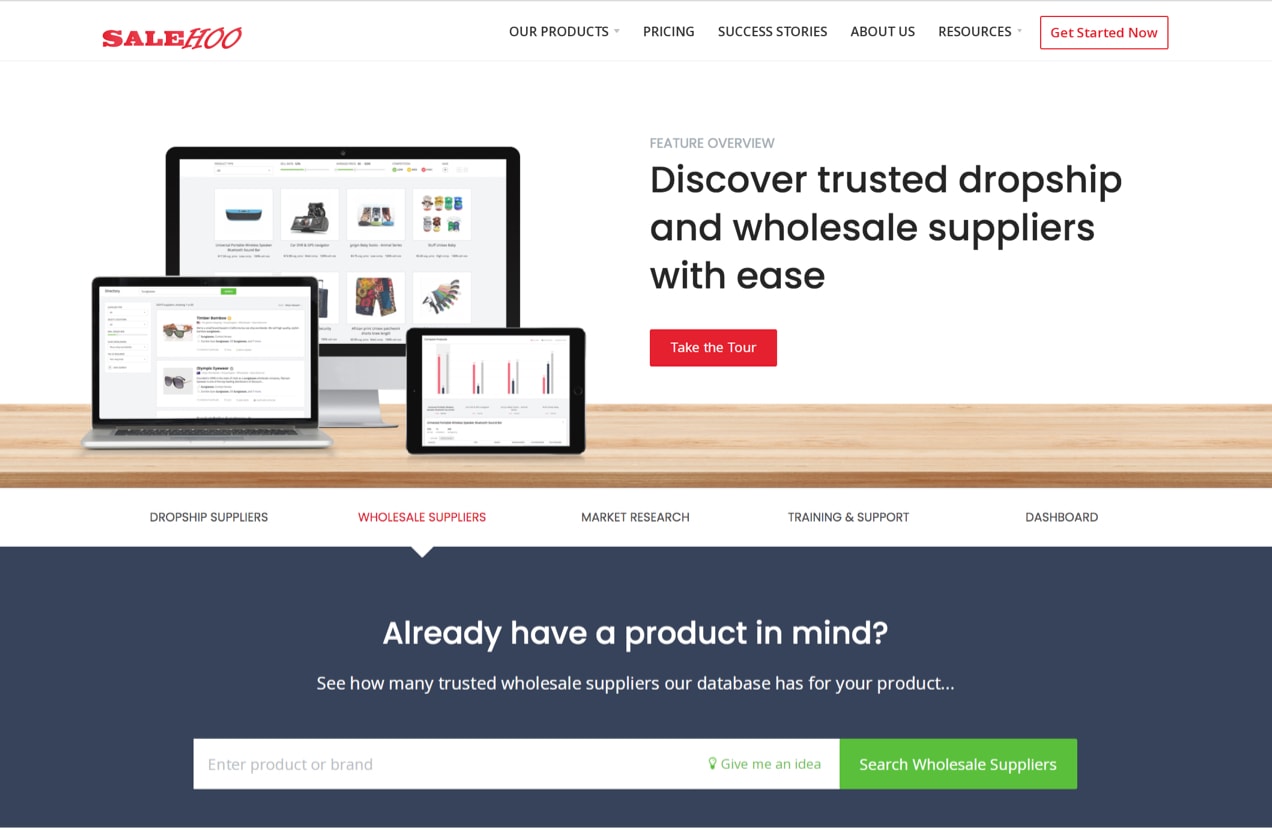If you run a product-based business, you know that there are a number of ways to obtain the goods you sell. You may choose to create or manufacture products yourself. Or, perhaps you print on demand or dropship items.
But other stores simply choose to curate existing products and market them to new audiences. This is what many traditional main street stores have done for years — and online stores do the same. These stores are known as “retailers.”
And if that’s what you’re doing, you’ll quickly find that working with wholesalers is a major key to success.
Whether you’re new, established, or looking to expand your income streams, choosing which wholesale suppliers to work with is a critical decision. A bad distributor can cause a lot of headaches.
Let’s jump in with the basics and understand the role a wholesaler plays in your business, and then look at how to find and select the best suppliers to work with.
What is a wholesaler?
A wholesaler is a middleman between a manufacturer and a retailer. Manufacturers create and build stuff, but they don’t know how to sell it. Retailers want to sell stuff, but they don’t have any products because they haven’t created anything.
Enter the wholesaler. They buy from manufacturers, usually in large volumes, and then sell to retailers and smaller wholesalers in various regions. The wholesaler is the link in the supply chain — the cog in the wheel — connecting retailers and eCommerce businesses with manufacturers.
How can a wholesaler help your business?
A wholesale supplier keeps your business flowing and prevents you from running out of product, while also removing the need for you to store overly large quantities of the items you sell.
Other ways wholesale suppliers, also called distributors, help retail and eCommerce businesses include:
- Keeping your costs down and boosting profit margins
- Ensuring consistent on-time delivery and product availability for customers
- Increasing potential for product variety and new products
- Removing the need for you to develop items
- Strengthening your ability to compete on price with other retailers
- Making it easy to find products and manufacturers you would otherwise never know about
What makes a good wholesaler?
Believe it or not, there are at least 410,000 wholesalers operating just in the United States. Not all of them are based there, but that’s how many operate. Some are very large — such as Alibaba which is based in China but operates pretty much everywhere — but most wholesalers are actually small and local.
A good wholesaler:
- Offers consistent and fair prices you can work with
- Provides quality customer service
- Serves the area or region where you operate
- Is trustworthy and reliable — doesn’t fail to deliver on time
- Has healthy relationships with manufacturers of the products you need
- Works with you to develop a contract that sets you up for success
- Is not also operating a retail business of their own
How to find a good wholesaler
1. Do an internet search
It’s really that easy? Well actually, it might be, especially if you want to work with a local wholesaler. Use a search term that includes your location, your product type, and a word like “wholesaler,” “distributor,” or “bulk.”
For example, if your business wants to sell pillows, and you’re in Denver, search for ‘Denver pillow wholesalers’.
It’s possible that nothing comes up depending on your industry and location. But you might end up finding a great local supplier. The advantage of a local supplier is that you can go meet them, verify they exist, look at their products, and establish a trusting relationship.
2. Use the big wholesaler websites
There are a number of these, and each has their pros and cons. Take your time. These sites work with hundreds of thousands of manufacturers, and collectively, you can find just about anything you need here.

Some big names include Alibaba, SaleHoo, Wholesale Central, Global Sources, Buyer Zone, Busy Trade, and EC21.
3. Attend a trade show
Again, trust and relationships are the heartbeat of wholesale. Meeting in person is a great thing, and trade shows are one of the best places to meet wholesalers, as well as actual manufacturers.
There are trade shows for just about any industry, and you can find shows, dates, and locations for trade shows on the Trade Show News Network, as well as 10 Times.
4. Get multiple quotes
It’s to your advantage to price out multiple wholesalers, and depending on how many products you sell, it’s often just as smart to work with more than one. If one ends up failing you for some reason — like it stops working with a key manufacturer — you’ll have redundancy already in place.
So, talk to several up front. Find out what they can offer you. Get price quotes. We’ll talk more in a bit about what specific questions to ask potential wholesalers.
5. Join local associations
Especially in larger cities, you can usually find a Chamber of Commerce, various small business groups and trade associations, and networking groups that will have expertise among their members. These are the perfect people to make wholesaler recommendations based on real experience.

6. Order samples
Any good wholesaler will agree to this, and the first reason to request samples is obvious — to assess quality. You want to be able to stand behind whatever you’re selling.
But the second reason is that ordering samples gives you a chance to experience their customer service. A lousy experience here doesn’t bode well for future service when it really matters. Things like late deliveries, damaged products, lack of response to phone calls and emails — these are signs that this company doesn’t prioritize your business.
7. Read reviews
Reviews for wholesalers can be hard to come by in some cases, but the big sites like Alibaba have a customer rating feature. This allows you to see what other business owners have said about particular providers. You can tell pretty quickly if business owners are frustrated or thrilled about a distributor.
Look for comments about problem resolution, service, delivery issues, and product quality.
Questions to ask potential wholesale suppliers
Once you start getting a few wholesalers on the phone, you need to narrow them down and figure out the ones you want to work with. Use these questions to help.
Do you have a retail or dropshipping business, too?
In most cases, if the answer is yes, then move on. A company like this could simply take your customers and start selling to them directly. Work with wholesalers who only do wholesaling.
What are your pricing options?
This will obviously vary for each product, but you’re looking for a sense of how prices change based on volume. Minimum order size plays into this as well.
Suppose one wholesaler offers a product for $1.50 per item, but has a minimum order size of 10,000. They’re selling to big companies. Another wholesaler might offer you the same item for $2.50, but has a minimum of just 500.
As a smaller business, you don’t want to be burdened with massive inventory. It’s costly and risky. So you might opt for the higher per-item cost coupled with the lower minimum.
Also, when you negotiate the contract, try to work in a clause that includes a volume ladder, where you’re promised lower prices at higher volumes if you’re able to grow your business.
What is your contract process?
You’ll want to negotiate several items, and the pricing ladder is just one of them. For instance, can they agree to a delay or a spreading out of payments? Cash flow is critical, so it’s preferable for you if you can start selling products before you have to pay for all of them.
Many wholesalers will offer something like a 30-day delay on your payment so you have a month to produce some revenue before having to pay the wholesaler. You want some kind of clause like this if you can get it.
A related question to this is, what kind of line of credit can they offer you?
What is your return policy?
If a product causes problems for customers and you realize it’s not sellable, will the wholesaler work with you to return the remaining inventory? Find out their process for this.
Will I get a dedicated sales rep?
You want to work with the same person on every call, because they’ll learn about your business, understand what you’re looking for, and speed up your interactions. After all, they won’t have to begin every call with “can you please state your first and last name?” ,
Wholesaling is very much about relationships. Work with a company that lets you have one.
How does shipping work?
Who pays for shipping? What are the terms? Can they ship quickly if you sell out of a product and need more immediately? Find out everything you can about their shipping processes and terms.
Are you a fraud?
Okay, don’t ask that. But do your due diligence, especially if you’re doing all of this online.
For instance, every wholesaler has an address. It is, after all, a warehouse business. Find their address and verify that it’s real. Use Google Street View and actually look at their location. If it’s a bunch of bushes next to the freeway, run. Check their Better Business Bureau listing. If they don’t have one, be suspicious.
Call them and test their phone number and customer service. Lousy service, bad connections, dropped calls, people who don’t sound knowledgeable or professional — these are big warning signs.
Also, every wholesaler should accept credit cards and most accept checks. If they only accept wire transfers, that’s another big red flag.
What happens after you choose a wholesaler?
This is an ongoing process. It’s likely that you’ll switch or add new wholesalers into your supply chain as the years go on and your business grows and changes. In most cases, it’s unwise to be completely dependent on one of anything, and that includes wholesalers.
Continue to be open to searching for and making deals with new providers.
